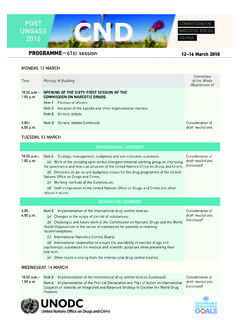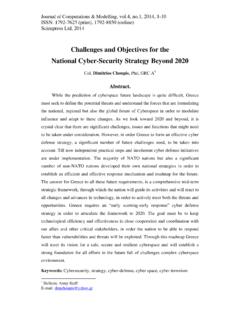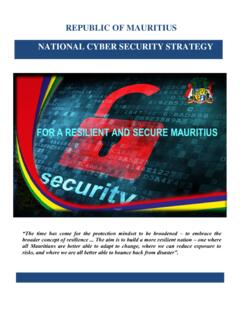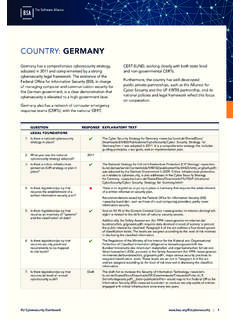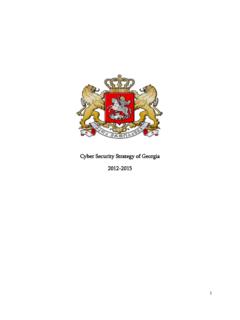Transcription of Government Decision No. 1139/2013 (21 March) on the ...
1 Government Decision No. 1139/2013 (21 March) on the national cyber security strategy of Hungary 1. The Government hereby approves the national cyber security strategy of Hungary laid down in Annex No. 1. 2. The Government instructs the state secretary heading the Prime Minister s Office to take the necessary action to establish the national cyber security Coordination Council. Person in charge: State secretary heading the Prime Minister s Office, supported by the ministers with the relevant responsibilities and powers Deadline: 30 June 2013 3. The Government instructs the state secretary heading the Prime Minister s Office to prepare a working and action plan for implementing the tasks defined in the national cyber security strategy of Hungary. Person in charge: State secretary heading the Prime Minister s Office, supported by the ministers with the relevant responsibilities and powers Deadline: 30 June 2013 4.
2 This Decision shall come into force on the day after its publication. Viktor Orb n Prime Minister (signed) Annex 1 to Government Decision No. 1139/2013 (21 March) national cyber security strategy of Hungary 1. In accordance with the principles of the Fundamental Law and based on the review of the relevant values and interests and on the analysis of the security environment of the cyberspace, the purpose of this strategy is to determine national objectives and strategic directions, tasks and comprehensive Government tools which enable Hungary to enforce its national interests in the Hungarian cyberspace, within the context of the global cyberspace. The strategy aims at developing a free and secure cyberspace and protecting national sovereignty in the national and international context, which has undergone a significant change due to the emergence of the cyberspace, a new medium which has become a key factor in the 21st century.
3 Furthermore, it aims at protecting the activities and guaranteeing the security of national economy and society, securely adapting technological innovations to facilitate economic growth, and establishing international cooperation in this regard in line with Hungary s national interests. This strategy indicates that Hungary is ready to perform and take responsibility for cyberspace protection tasks and intends to develop the Hungarian cyberspace as a key element of Hungarian economic and social life into a free, secure and innovative environment. By way of efficient protective measures based on prevention, the primary objective is to manage the threats emerging in and coming from the cyberspace, along with the related risks, as well as to reinforce Government coordination and the range of available tools.
4 2. This strategy reflects the basic values enshrined in the Fundamental Law of Hungary, specifically freedom, security , justice, international and European cooperation, in a separate field of security and economic policy; it is a document of cyber security for national data assets as part of national assets, derived from Section 38 of the Fundamental Law, as well as for the related vital systems and facilities. In accordance with the Hungarian national security strategy , accepted through Government Decision No. 1035/2012 (21 February), and using it as a basis, the strategy elaborates on the endeavours and Government responsibilities mentioned in Section 31. Its roots go back to the Budapest Convention adopted in 2001 ( Convention on Cybercrime ); an international convention which defines internationally recognised principles and is still used as a reference.
5 At the same time, the strategy is aligned with the recommendations of the European Parliament for the Member States included in Decision No. 2012/2096(INI) on cyber security and defence, adopted on 22 November 2012, and with the joint communication published by the European Commission and the High Representative of the Common Foreign and security Policy of the European Union on 7 February 2013 under the title Cybersecurity strategy of the European Union: An Open, Safe and Secure Cyberspace . Furthermore, the strategy is in line with the Strategic Conception of the NATO accepted in November 2010, the cyber security Policy of the Organisation adopted in June 2011 and its implementation plan, as well as with the cyber protection principles and objectives set forth in the documents of the NATO summits held on 19-20 November 2010 in Lisbon and on 20-21 May 2012 in Chicago.
6 I. The cyber security environment in Hungary 3. Cyberspace means the combination of globally interconnected, decentralised and ever-growing electronic information systems, and social and economic processes represented in the form of data and information through these systems. The Hungarian cyberspace is a part of the electronic information systems of the global cyberspace located in Hungary, as well as social and economic processes represented in the form of data and information through the electronic systems of the global cyberspace which take place in, are directed to, or affect Hungary. 4. The increasing number of threats emerging in the cyberspace from several sources, whose consequences have also become considerably more severe, indicate that the number and efficiency of public and non-public users using the cyberspace for the illegal acquisition of critical data and information and for causing damage to communication and information systems has grown rapidly over the past few decades.
7 This new form of warfare, called information warfare, which has rendered the cyberspace one of the most important theatres of operations in modern warfare, threatens the functioning of our vital electronic information systems and hence our vital systems and facilities. In addition to the external damage caused, a further risk is represented by the inadequate regulation of the operational security of the information and communication systems as constituents of the cyberspace. Dynamically developing new technologies, such as the cloud or mobile Internet, lead to the continuous emergence of new security risks. A key objective of this strategy is to establish a political and professional Decision -making focus and ability which will allow in the foreseeable future, by flexible adaptation, the proper management of new cyber security challenges arising from technological progress.
8 5. cyber security is the ongoing and planned application of political, legal, economic, educational, awareness-raising and technical tools capable of managing cyberspace risks, transforming the cyberspace into a reliable environment by ensuring an acceptable level of such risks for the smooth functioning and operation of social and economic processes. II. Hungary s cyber security values, vision and objectives 6. The protection of Hungary s sovereignty is a national interest in the Hungarian cyberspace too; a free and secure operation of the Hungarian cyberspace in line with the rules of democracy and law is regarded as a vital value and interest. In Hungary, the freedom and security of the cyberspace is ensured through the close cooperation and coordinated activities of the Government and the scientific, economic and civil communities, on the basis of joint responsibility.
9 7. Hungary strives to establish and maintain cooperation based on mutual trust with all public and non-public actors of the global cyberspace representing similar values, and endeavours to guarantee a free and secure use of the global cyberspace through its allies and international relations, particularly the EU and the NATO, the Organization on security and Cooperation in Europe (OSCE), the United Nations, the Council of Europe and other international organisations in which the country is a member. Hungary is aware that cyberspace threats and attacks may reach a level which would require the cooperation of allies, and regards it as crucial that the issue of cyber security has been included in the scope of collective protection under Article 5 of the foundation document of the NATO. Hungary is interested in this international alliance cooperation for the sake of its own security too.
10 Hungary pays special attention to the Central and Eastern European region, and sees room for improvement regarding cyber security in this region through regional cooperation. 8. To meet present and future challenges, Hungary stipulates the requirement that the Hungarian cyberspace shall provide a secure and reliable environment: a) for individuals and communities, to ensure social development and integration through free and secure communication guaranteeing the protection of personal information, b) for economic actors, to develop efficient and innovative business solutions, c) for future generations, to ensure value-based education and the collection of experiences resulting in healthy, undisturbed mental development, d) for electronic public administration, to promote the innovative and future-oriented development of public services.








